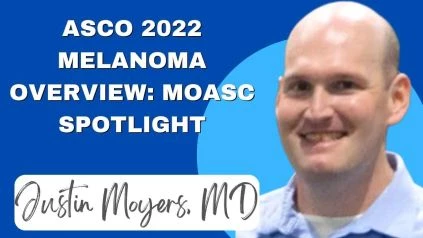ASCO 2022 Melanoma Overview: MOASC Spotlight
Â
KEYNOTE-716 Study
Â
Today, we talked about some of the exciting new discoveries that have been made with melanoma abstracts or clinical trial(s) over the course of the past year, at the ASCO 2022 annual meeting. The first thing that we did was look at the KEYNOTE-716 research presented at ASCO 2022 (melanoma), which was a comparison between using pembrolizumab as an adjuvant treatment and using a placebo. The stage 2 melanomas were the primary focus of the study.
Â
And the recurrence-free survival rate for pts with stage 2B and stage 2C melanomas improved over the course of our study. Pembrolizumab an immune checkpoint inhibitor is administered to the patient by a medical professional(s).
Â
Principal Investigator On KEYNOTE-716 Clinical Trial
“Patients with stage IIB/C melanoma have similar rates of recurrence and melanoma specific survival to those with stage IIIA/B disease. Despite this, adjuvant anti-PD-1 immunotherapy has only been available in standard practice for stage III disease,â€
“The results of KEYNOTE-716 will facilitate access to anti-PD-1 for stage IIB/C patients and, in a sense, level the playing field against melanoma.†Jason J. Luke, MD, FACP
RELATIVITY-047 Study
Â
The other abstract that we looked through was called RELATIVITY-047, and it described a novel application of the medicine relatlimab in combination (arm) with nivolumab. When compared to nivolumab on its own, the marketed version is known as Opdualag.
Â
And what we (healthcare professionals) found was that whether the combination (arm) medicine was given in the metastatic (melanoma) setting or in the locally advanced setting as first-line therapy (combination therapy), there was an improvement in the progression-free survival for pts. This was something that we saw. The combination (therapy) of nivolumab and ipilimumab, when administered in the new adjuvant setting for stage 3B and stage 3C melanoma, was the subject of the third abstract that we examined.
Â
About the RELATIVITY-047 study
Â
RELATIVITY-047 (CA224-047) is a randomized, double-blind study evaluating the fixed-dose combination of relatlimab and Opdivo in pts with previously untreated metastatic (melanoma) or unresectable melanoma versus Opdivo alone. Pts in this study have not received any prior treatment for their melanoma. The progression-free survival (PFS) measured by Blinded Independent Central Review (BICR) is the primary endpoint; overall survival (OS) and overall response rate are its secondary endpoints (ORR) (manageable safety profile).
Â
A total of 714 pts were randomly assigned to receive either a fixed-dose combination of relatlimab 160 mg and Opdivo 480 mg or Opdivo 480 mg by intravenous infusion every four weeks until disease recurrence, unacceptable toxicity, or withdrawal of consent. Patients were assigned to receive one of the two treatments based on their preference. Ongoing monitoring is being performed for the secondary endpoints of OS and ORR, as well as, evaluate the safety and efficacy (manageable safety profile).
Â
PRADO Study
Â
This is called a PRADO study. This is an expansion of the OpACIN-neo study out of the Dutch group. And they found that the pathological response was high when two cycles of NIVO plus IPI were used three weeks apart, and surgery was done. They were also able to spare many people complete therapeutic lymph node dissection using the new adjuvant therapy.Â
Â
PRADO Extension Cohort Study
Â
PRADO extension cohort will enroll around 100 to 110 patients with macroscopic stage III disease (RECIST-measurable disease); patient enrollment will end when 50 patients achieve a pCR or pnCR. All patients will be treated with the winning combination identified in the initial phase of the OpACIN-neo research, which is 2 sessions of ipilimumab 1 mg/kg plus nivolumab 3 mg/kg every three weeks.
Â
After six weeks of treatment, only surgical excision of the marked index lymph node will be performed. In accordance with the achieved pathologic response rates, additional surgery and adjuvant treatment will be administered by healthcare professionals.
Â
DREAMseq Study
Â
The fourth abstract we talked about was DREAMseq, which was the sequencing of BRAF/MEK inhibitors, dabrafenib, and trametinib. And nivolumab and ipilimumab in BRAF mutants metastatic melanoma patients, and the dream seek trial compared sequencing immunotherapy, targeted therapy versus targeted therapy, then immunotherapy.
Â
They found that the sequence of immunotherapy then targeted therapy led to superior overall survival at two years. And so, this confirms the sequencing for BRAF mutant melanomas.
Â
I think the abstracts today over some of the key updates in melanoma over the last 12 months or so have really defined. The treatment for first-line therapies in metastatic melanoma with BRAF mutations. It also highlights the use of a new adjuvant therapy for stage 2B and 2C melanomas which is now FDA approved. And then also discusses the potential for new adjuvant therapy in stage three melanomas to try to spare them from morbid and aggressive surgeries.
Â
About the DREAMseq Study
Â
Patients with stage III-IV melanoma that contains a mutation known as BRAFV600 and cannot be removed by surgery are being studied in this phase III trial to determine how well initial treatment with ipilimumab and nivolumab followed by dabrafenib and trametinib works and to compare it to initial treatment with dabrafenib and trametinib followed by ipilimumab and nivoluma (unresectable). Immunotherapy utilizing monoclonal antibodies, such as ipilimumab and nivolumab, may assist the body’s immune system attack the cancer, and it may interfere with the capacity of tumor cells to develop and spread.
Â
These are both potential benefits of immunotherapy. By focusing on the BRAFV600 gene, the drugs dabrafenib and trametinib may be able to inhibit the growth of tumors, through long term follow up. It is not yet known if providing patients with a treatment consisting of dabrafenib and trametinib followed by ipilimumab and nivolumab is more successful than providing patients with a treatment consisting of dabrafenib and trametinib followed by ipilimumab and nivolumab, data that was gathered for healthcare professionals.
Justin Moyers, MD – ASCO 2022 Melanoma In-Depth Slides: MOASC Spotlight
https://oncologytube.com/v/41289
Justin Moyers, MD – MOASC Question and Answer Session –
https://oncologytube.com/v/41313
Justin Moyer, MD- About The Author, Credentials, and Affiliations
Medical oncologist and assistant clinical professor of medicine at the University of California, Irvine School of Medicine Justin T. Moyers is board certified in medical oncology and works at the University of California, Irvine Medical Center.
Â
His clinical interests include skin cancers. Melanoma is another one of his clinical specialties. His research interests include both the creation of therapies and the first phase, as well as the application of biomarkers and genomic data to the process of patient selection. He is now serving as the ASCO (American Society of Clinical Oncology) ( Editorial Fellow for JCO Precision Oncology, and he has presented research in the areas of melanoma database research, immunotherapy predictive biomarker research, and phase 1 combinatorial trial design at ASCO, SITC, ASCO-SITC, AACR, and ESMO.
Â
Dr. Moyers attended the University of Kansas, where he was awarded a Bachelor of Science degree in Chemistry. He then went on to earn his medical degree from the University of Kansas School of Medicine. After completing his internship in internal medicine at Providence St. Vincent Medical Center in Portland, Oregon, he went on to do a fellowship in hematology and clinical oncology at Loma Linda University Medical Center in Loma Linda, California. Last but not least, he finished a fellowship at the University of Texas MD Anderson Cancer Center in Houston, Texas. The fellowship was in the Department of Investigational Cancer Therapeutics.
Â
Justin Moyers, MD MOASC Presentation – https://oncologytube.com/v/41289
Â
Zachary Hanson, DO – Anemia and Zinc Deficiency [2022]: MOASC Spotlight
https://oncologytube.com/video/41301
Â
Â
Reference
-
Healio News – Results of KEYNOTE-716 trial may ‘level the playing field against melanoma’. Healio News Article, September 18, 2021
-
Bristol Myers Squibb – Bristol Myers Squibb Announces RELATIVITY-047, a Trial Evaluating Anti-LAG-3 Antibody Relatlimab and Opdivo (nivolumab) in Patients with Previously Untreated Metastatic or Unresectable Melanoma, Meets Primary Endpoint of Progression-Free Survival. Bristol Myers Squibb Press Release, March 25, 2022
-
Clinical Trials .gov – Dabrafenib and Trametinib Followed by Ipilimumab and Nivolumab or Ipilimumab and Nivolumab Followed by Dabrafenib and Trametinib in Treating Patients With Stage III-IV BRAFV600 Melanoma. Clinical Trials .gov, August 31, 2022


